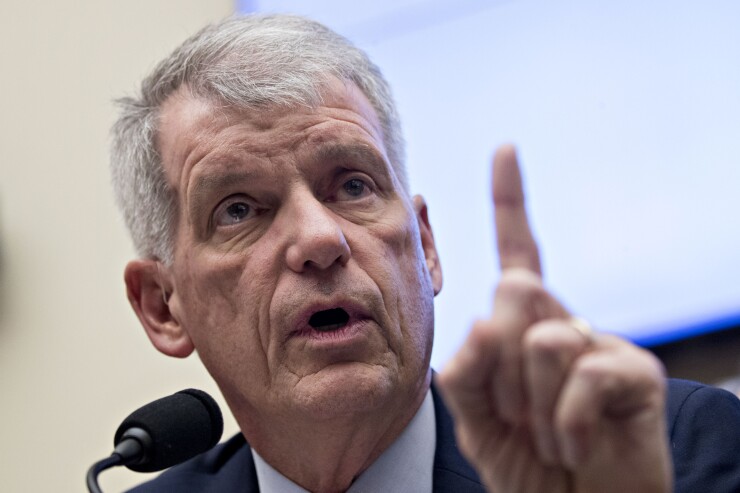In the 17 months since CEO Tim Sloan last faced hostile questions on Capitol Hill, Wells Fargo’s regulatory woes have multiplied to such an extent that lawmakers had trouble Tuesday focusing their outrage.
Sloan was asked about 545 homeowners who were wrongly foreclosed on because of a Wells computer error. He was asked about auto loan borrowers who were overcharged, mortgage customers who paid too much and military service members whose vehicles were illegally repossessed. He was asked about doctored paperwork and falsified customer signatures.
Time and again, Sloan repeated versions of the same mantras that he has been delivering since becoming CEO in late 2016. He argued that company is in the midst of a transformation, and he promised compensation for customers who suffered harm.

But the tensest moments came during discussions — sparked by
Sloan argued in his prepared testimony Tuesday that the bank’s corporate culture has improved substantially over the last two and a half years.
“Team members see this improvement in the elimination of product sales goals,” he said. “And they see it in a corporate culture that encourages team members to speak up without fear of retaliation when they see a problem.”
But in the Times story, some Wells Fargo employees painted a different picture. They said that the company still has a high-pressure sales culture, and they voiced fear that if they report problems, they will suffer retaliation.
The article quoted workers who are part of a group that is trying to unionize the San Francisco bank’s employees. That group, the Committee for Better Banks,
“While Wells Fargo changed the minutiae of its sales and compensation practices, they can still result in creating incentives that encourage employees to engage customers under pretexts to pitch products and increase sales volume,” the report stated.
Democrats and Republicans on the House Financial Services Committee asked Sloan about the Times article, and he pointedly challenged its claims. Sloan’s comments were
“We disagree with almost every statement that’s made in that New York Times article,” Sloan told Rep. Scott Tipton, R-Colo., on Tuesday.
But during the hearing, one of the New York Times reporters, Emily Flitter,
Sloan was even more categorical in his denial of the Committee for Better Banks’ claims. He said that Wells Fargo disagrees with everything in the group’s report, other than the spelling of the bank’s name and the fact that Wells Fargo has raised its minimum wage to $15 an hour.
But when Sloan was pressed on certain specific allegations, he expressed less certainty.
Rep. Cindy Axne, D-Iowa, asked Sloan about the New York Times’ contention that performance targets at the bank’s debt-collection operation in Des Moines were recently increased. “I’m not familiar with those specific targets,” he responded.
In response to a question from Rep. Ben McAdams, D-Utah, Sloan acknowledged that Wells employees may have a negative perception of the bank’s culture.
“I don’t mean to question how any of our team members feel,” he said. “And there’s no question that improving culture is a journey.”





